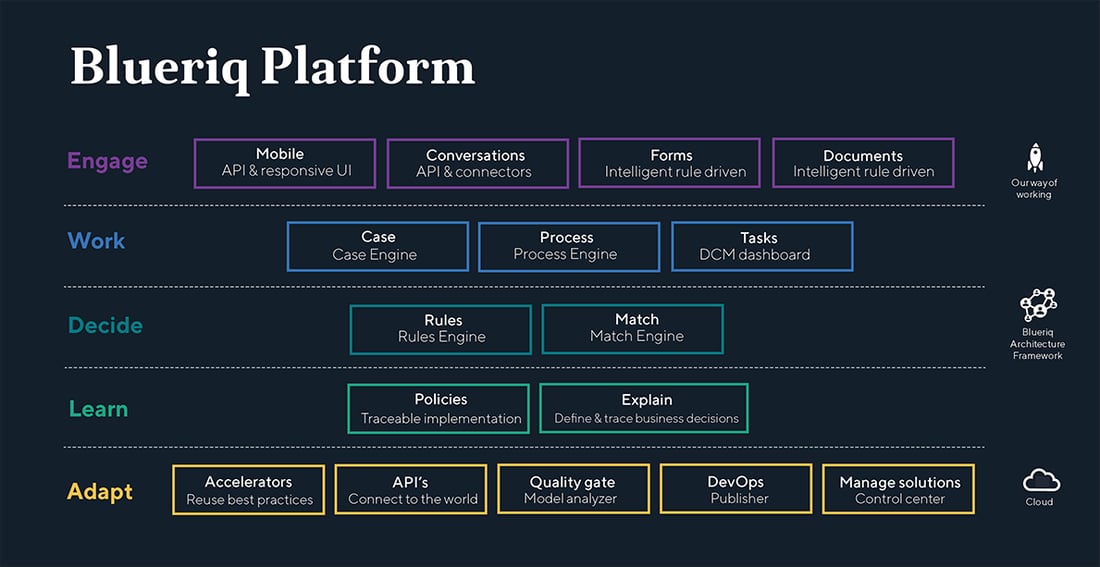We know our technology inside out and love to share it with business engineers, architects and developers. Take a look at our roadmap and see what we're working towards now. Or check out our Research page and get an idea of our research projects.
Each item on our roadmap is linked to one of the categories within our platform, namely Engage, Work, Decide, Learn and Adapt. You can see on this image what each category enables. And so we are continuously enriching that, as you can see in our roadmap.

Can we use past experiences during the execution of applications to predict and accelerate our current work?
Can we predict the best next action, based on previous execution and case data, to minimize the remaining execution time for this case?
Can we use past experiences during the execution of applications to predict and accelerate our current work?
Can we predict the best next action, based on previous execution and case data, to minimize the remaining execution time for this case?

Here at Blueriq, we deliver a platform for the design, realization and eventually execution of webservices, forms, processes and case management solutions. We can deliver these functionalities dynamically, by virtue of our ability to execute logic. Our Rule Engine enables us to derive new information from user input, external data or other forms of information by executing the logic that has been modelled into Rules and Decision Tables using our Encore studio.
The information that is thus derived can be used to make decisions, whether these are formal or internal. For instance, the derivation of a fact from input data can result in the decision to perform a task, or the information entered into a form and the subsequent application of business rules to this information can cause the decision to grant a loan, subsidy or product.
These decisions are all based on factual information, either direct our derived from the execution from rules. These facts are inherently rather rigid: a fact is either true or false. But what if we want to incorporate past experience in our decision making? In a rule-based system this means the rules have to be adapted, so that the derived facts represent the expectations we have because of our experience.
In a software delivery world, even using agile methodologies and a platform like ours that makes designing, realizing, testing and delivering the execution of these rules considerably easier than in a classic high coding context, this means a delivery pipeline has to be traversed, starting with (human!) interpretation of the past experiences and ending with the deployment of a new piece of software. This can be complex, time consuming and error prone. So how can we make our applications use experiences without these setbacks?
Fuzzy logic classically provides a solution to rules that are not (yet) clear cut. By comparing a current use case to a collection of information gathered earlier, the steps taken in the most similar case found can be repeated. Whether this is the making of a decision or the taking of an action, the similarity to past experiences gives a (limited) guarantee that we can do the same thing again. In reasoning task this is referred to as case-based reasoning, called thus because it requires a case base, or repository of past experiences, to compare a current case to and score similarity by applying a matching algorithm. Usually, similarity score is represented using a percentage. This percentage can be viewed as the probability that execution in this fashion will yield favorable results. The information that is thus derived can be used to make decisions, whether these are formal or internal. For instance, the derivation of a fact from input data can result in the decision to perform a task, or the information entered into a form and the subsequent application of business rules to this information can cause the decision to grant a loan, subsidy or product.
In this initiative we aim to investigate - and realize - the use of experience in predicting favorable future execution, by applying this concept to prediction of case execution speed based on available choices by answering the flowing research question: can we predict the Best Next action, based on past execution and case data, to minimize the remaining execution time for this case?
To gradually come to the necessary knowledge and technology, this initiative will be built following these steps:


Do you have questions about new developments or are you curious about all the possibilities of the Blueriq platform? If so, please contact Yuri.